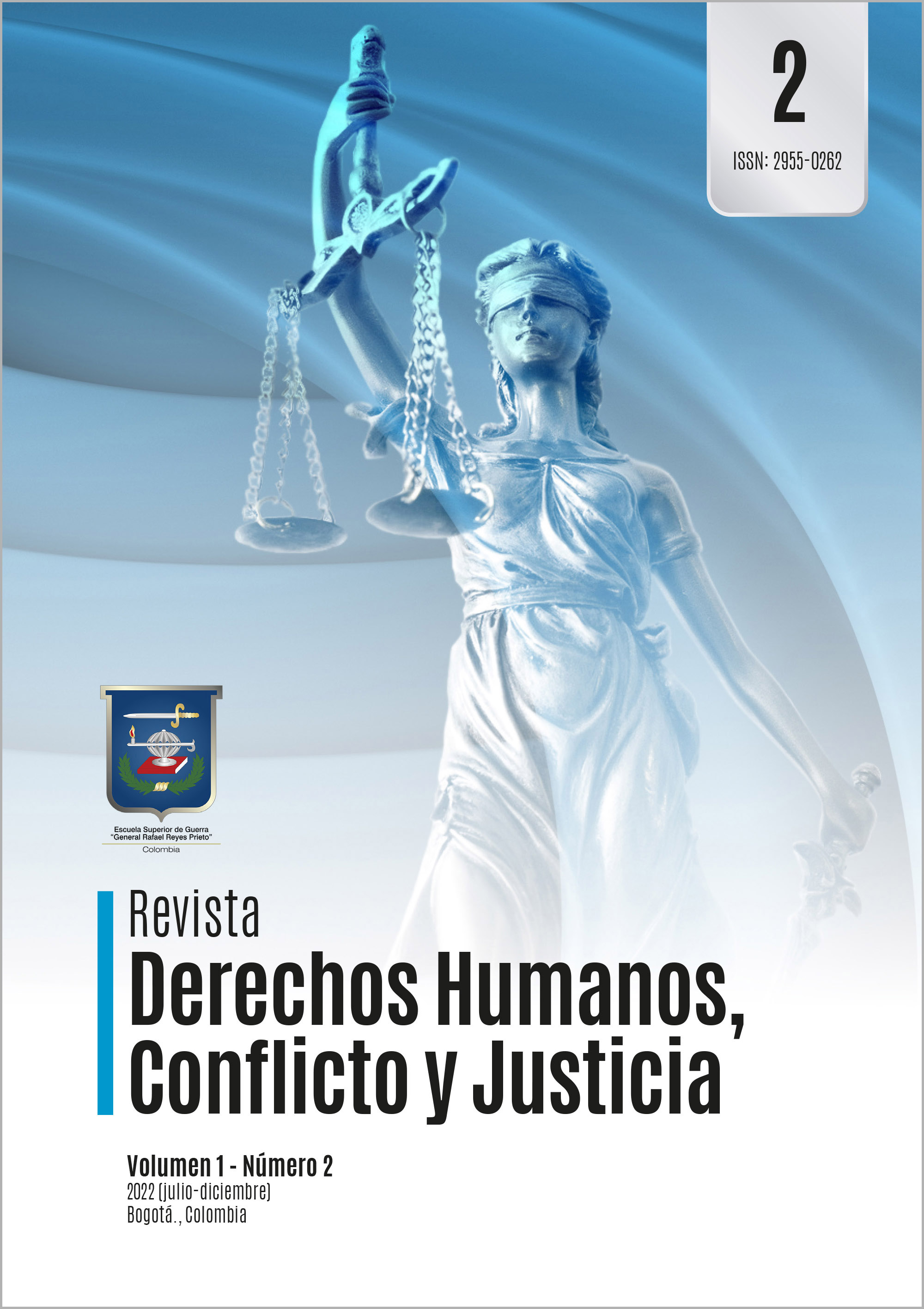The debt of the military penal code with the principle of taxation
An example taken from the crime of abandonment of post
DOI:
https://doi.org/10.25062/2955-0262.4714Keywords:
Principle of mere legality, principle of strict legality, taxation, penal guarantee, abandonment of the position, military penal codeAbstract
This article studies the tension between the principle of strict legality or strictness and the criminal type of abandonment of the position. To this end, and based on a methodology of qualitative approach and argumentative descriptive type, the work was divided into three chapters. In the first, the paradox that exists in being and should be in the task of adjudicating the right is exposed, to then conceptualize the principle of taxation and support the reasons why this is considered the basis of a cognitive criminal law model and, therefore, guarantor. Next, the study of the criminal type of abandonment of the content position in the current Military Penal Code is addressed and it is shown that it is written with vague and imprecise language, and, therefore, not exhaustive. Finally, some recommendations are presented to reconcile the application of the aforementioned crime with the principle of strict legality.
Author Biographies
Edwin Alexander Aranguren-Rodríguez, Escuela Superior de Guerra “General Rafael Reyes Prieto”, Bogotá D. C., Colombia
Major of the Colombian National Army. Specialist in Criminal Law, Sergio Arboleda University, Colombia. Specialist in Criminal Procedural Law, Universidad Externado de Colombia, Colombia. Lawyer, Pedagogical and Technological University of Colombia, Colombia. 14 years of experience in positions in Military and Police Criminal Justice.
Jefferson Francisco Pineda-Díaz, Escuela Superior de Guerra “General Rafael Reyes Prieto”, Bogotá D. C., Colombia
Major of the Colombian National Army. Specialist in Procedural Legal Institutions, National University of Colombia, Colombia. Specialist in Criminal Procedural Law, Universidad Externado de Colombia, Colombia. Lawyer, Pedagogical and Technological University of Colombia, Colombia. 17 years of experience in positions in Military and Police Criminal Justice.
References
Acto Legislativo 1 de 2015. Por el cual se reforma el artículo 221 de la Constitución Política de Colombia. junio 25 de 2015. DO. N.° 49.554
Alexy, R. (1978). Teoría de la argumentación jurídica (M. Atienza & I. Espejo, Trads.; 2. ed). Centro de Estudios Políticos y Constitucionales. archivo.uc3m.es/bitstream/handle/10016/1406/DyL-2000-V-9-Garcia.pdf
Atienza Rodríguez, M. (2013). Curso de argumentación jurídica. Trota.
Atienza, M. (2001). Entrevista a Robert Alexy. Doxa. Cuadernos de Filosofía del Derecho, (24), 671–687. https://doi.org/10.14198/DOXA2001.24.27
Beccaria, C. (2015). Tratado de los delitos y de las penas (M. Martínez, Trad.). Universidad Carlos III de Madrid. (Obra original publicada en 1774)
Código Penal Militar. Ley 1407 de 2010 [Agosto 17 de 2010]. Congreso de la República de Colombia.
Código Penal Militar. Ley orgánica 14 de 2015 [Octubre 15 de 2015] (España). https://www.boe.es/buscar/act.php?id=BOE-A-2015-11070
Comando General de las Fuerzas Militares. (2017). 3-9 Reglamento Servicio de Guarnición. (6. Ed) [Público]. Imprenta de las Fuerzas Miliares.
Constitución Política de Colombia [Const]. Julio 7 de 1991 (Colombia).
Corte Constitucional de Colombia. Sentencia C-077 de 2006, (M.P. Jaime Araujo Rentería; Febrero 8 de 2006).
Corte Constitucional de Colombia. Sentencia C-091 de 2017, (M.P. María Victoria Calle Correa; Febrero 15 de 2017).
Corte Constitucional de Colombia. Sentencia C-442 de 2011, (M.P. Humberto Antonio Sierra Porto; Mayo 25 de 2011).
Corte Suprema de Justicia. Sala de Casación Penal. Proceso 12878 (M. P. Jorge Aníbal Gómez Gallego; Mayo 23 de 2001).
Ejército Nacional de Colombia. (2009). EJC 3-22-1 Reglamento de Régimen Interno Para Unidades Tácticas. (2. Ed) [Restringido]. Publicaciones Ejército.
Ejército Nacional de Colombia. (2017). Manual fundamental de referencias del Ejército MFRE 4-0 Sostenimiento [Público] (1.a ed.). Centro de Doctrina del Ejército (CEDOE).
Ferrajoli, L. (2012). Constitucionalismo principialista y constitucionalismo garantista. (N. Guzmán Trad.) Doxa. Cuadernos de Filosofía del Derecho, 34 (15). https://doi.org/10.14198/DOXA2011.34.02
Ferrajoli, L. (2015). Epistemología Jurídica y Garantismo (J. Moreso, Trad.; quinta edición).
Ferrajoli, L. (2018). Derecho y razón: Teoría del garantismo penal (P. Ibáñez, A. Ruiz, J. Bayon, & J. Terradillos, Trads.; 10. ed). Ed. Trotta. (Obra original publicada en 1989).
García Amado, J. A. (2000). Razón práctica y teoría de la legislación. Derechos y Libertades. Revista del Instituto Bartolomé de las Casas, 5 (9), 299-317.
Gascón Abellán, M. (2014). La aplicación judicial del derecho como actividad interpretativa y probatoria. En Gascón Abellán, M. (Coord.), Argumentación jurídica (pp. 223-252). Tirant lo Blanch.
Laporta San Miguel, F. (1999). Materiales para una reflexión sobre racionalidad y crisis de la ley. Doxa. Cuadernos de Filosofía del Derecho, 0(22), 321-330. doi: https://doi.org/10.14198/DOXA1999.22.14
Lifante Vidal, I. (2013). Seguridad jurídica y previsibilidad. Doxa. Cuadernos de Filosofía del Derecho, 36 (85). https://doi.org/10.14198/DOXA2013.36.04
Marcilla Córdoba, G. (2014). Justificación de las decisiones legislativas: Un corolario del estado constitucional. En Gascón Abellán, M. (Coord.), Argumentación jurídica (pp. 459-493). Tirant lo Blanch.
Mejía, L. M. (2013). El debilitamiento del principio de legalidad penal en las decisiones de control de constitucionalidad de la corte constitucional colombiana. Nuevo Foro Penal, 8 (78), 107–145. https://doi.org/10.17230/nfp.8.78.4
Prieto Sanchís, L. (2014). La teoría de la interpretación en el origen de la justicia constitucional y en el desarrollo de la teoría de la argumentación. En Gascón Abellán, M. (Coord.), Argumentación jurídica (pp. 43-71). Tirant lo Blanch.
Reyes Echandía, A (1987). Derecho Penal. Parte General. (11. Ed). Editorial Temis.
Tamayo Arboleda, F (2013). El principio de tipicidad como límite al poder punitivo del Estado (Comentarios al artículo 10 del Código Penal Colombiano). Nuevo Foro Penal 9 (80), 34- 81. https://doi.org/10.17230/nfp.9.80.2
Tribunal Superior Militar y Policial de Colombia, Sala Cuarta de Decisión. Proceso 156500 (M.P. TC. Camilo Andrés Suárez Aldana; Mayo 25 de 2010).
Tribunal Superior Militar y Policial de Colombia, Sala Cuarta de Decisión. Proceso 157236 (M.P. CN (r.) Carlos Alberto Dulce Pereira; Julio 13 de 2012).
Tribunal Superior Militar y Policial de Colombia, Sala Primera de Decisión. Proceso 158968 (M.P. CR. Marco Aurelio Bolívar Suárez; Febrero 14 de 2019).
How to Cite
Downloads
Downloads
Published
Issue
Section
License
Copyright (c) 2022 Derechos Humanos, Conflicto y Justicia

This work is licensed under a Creative Commons Attribution-NonCommercial-NoDerivatives 4.0 International License.

















